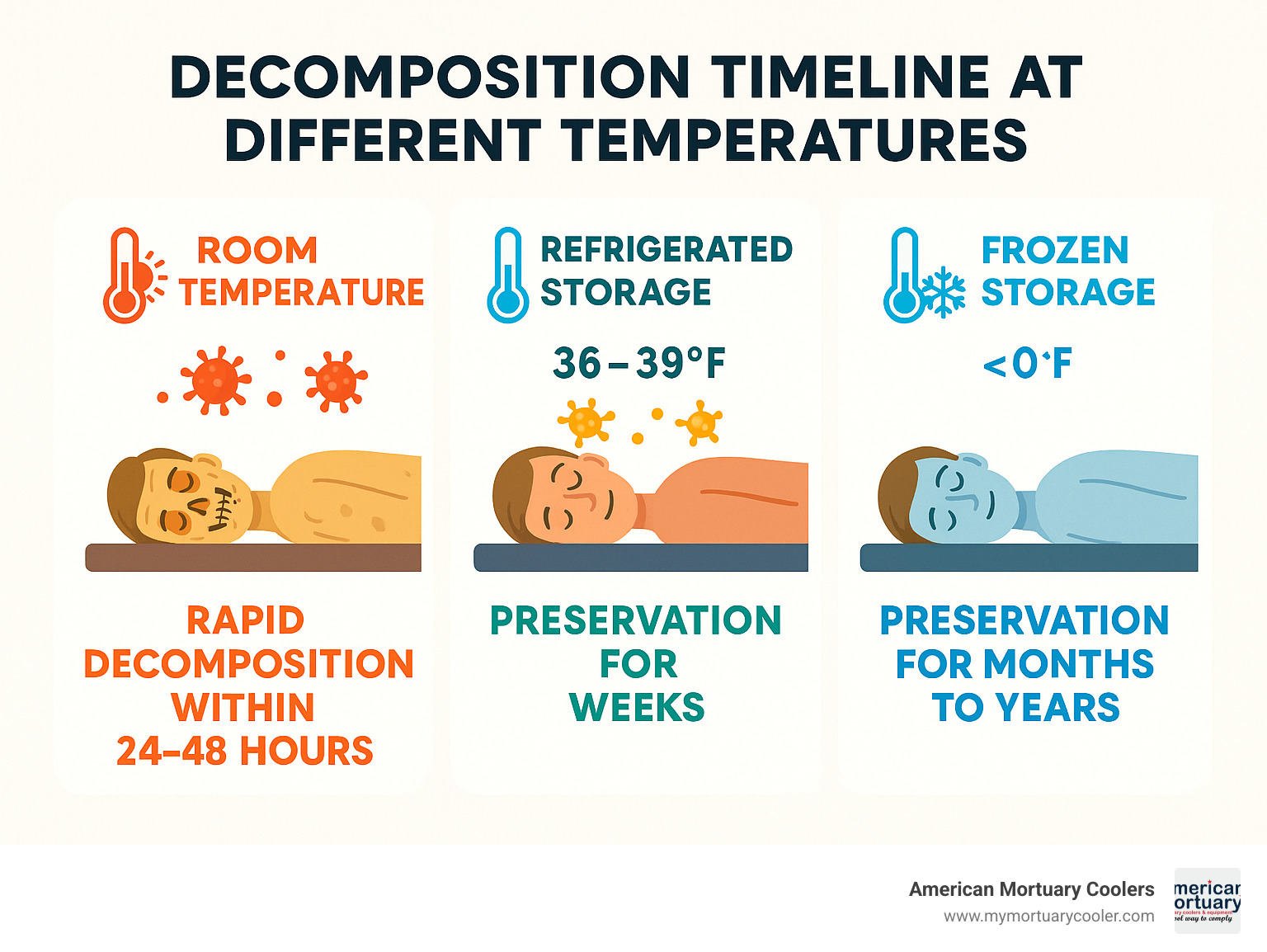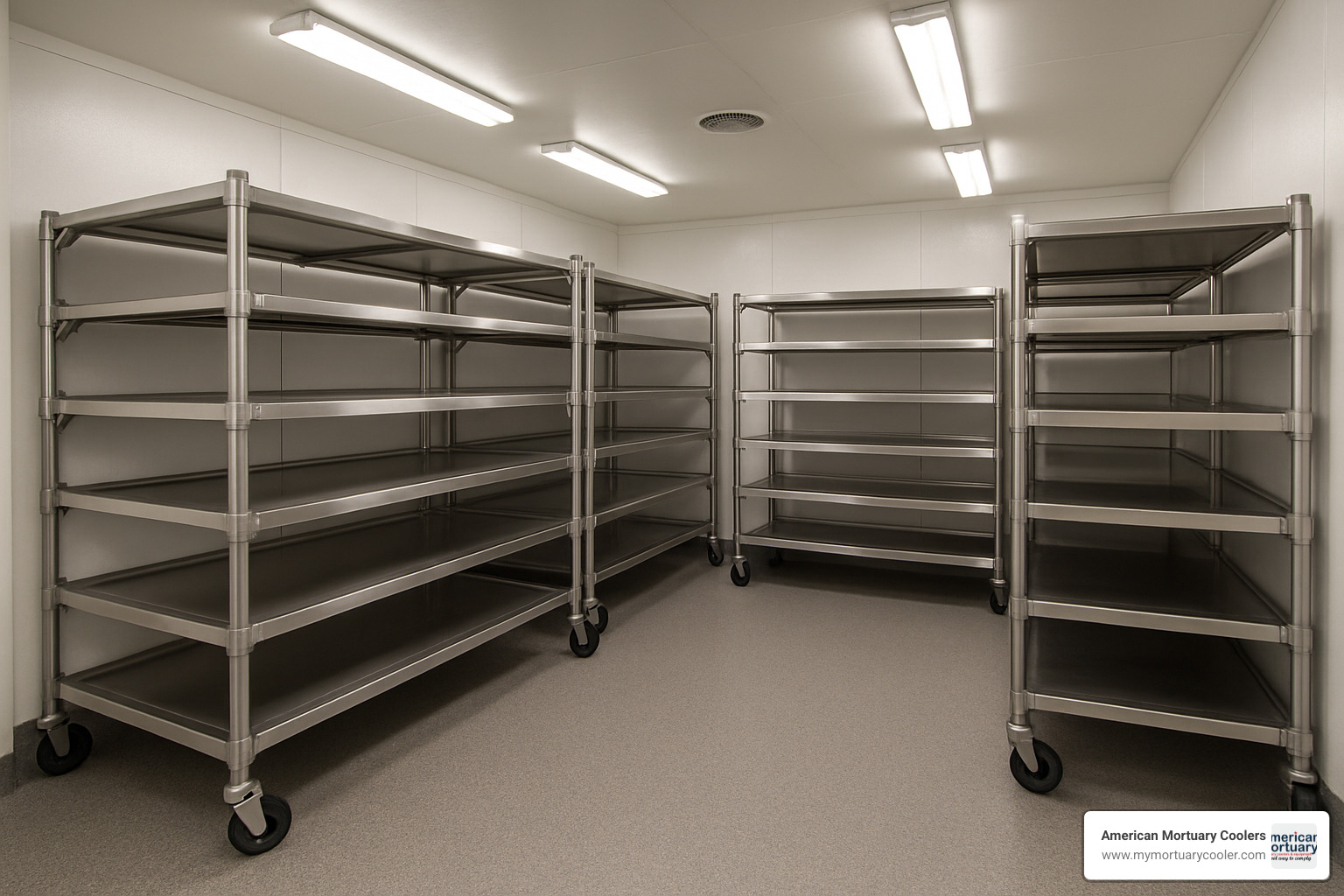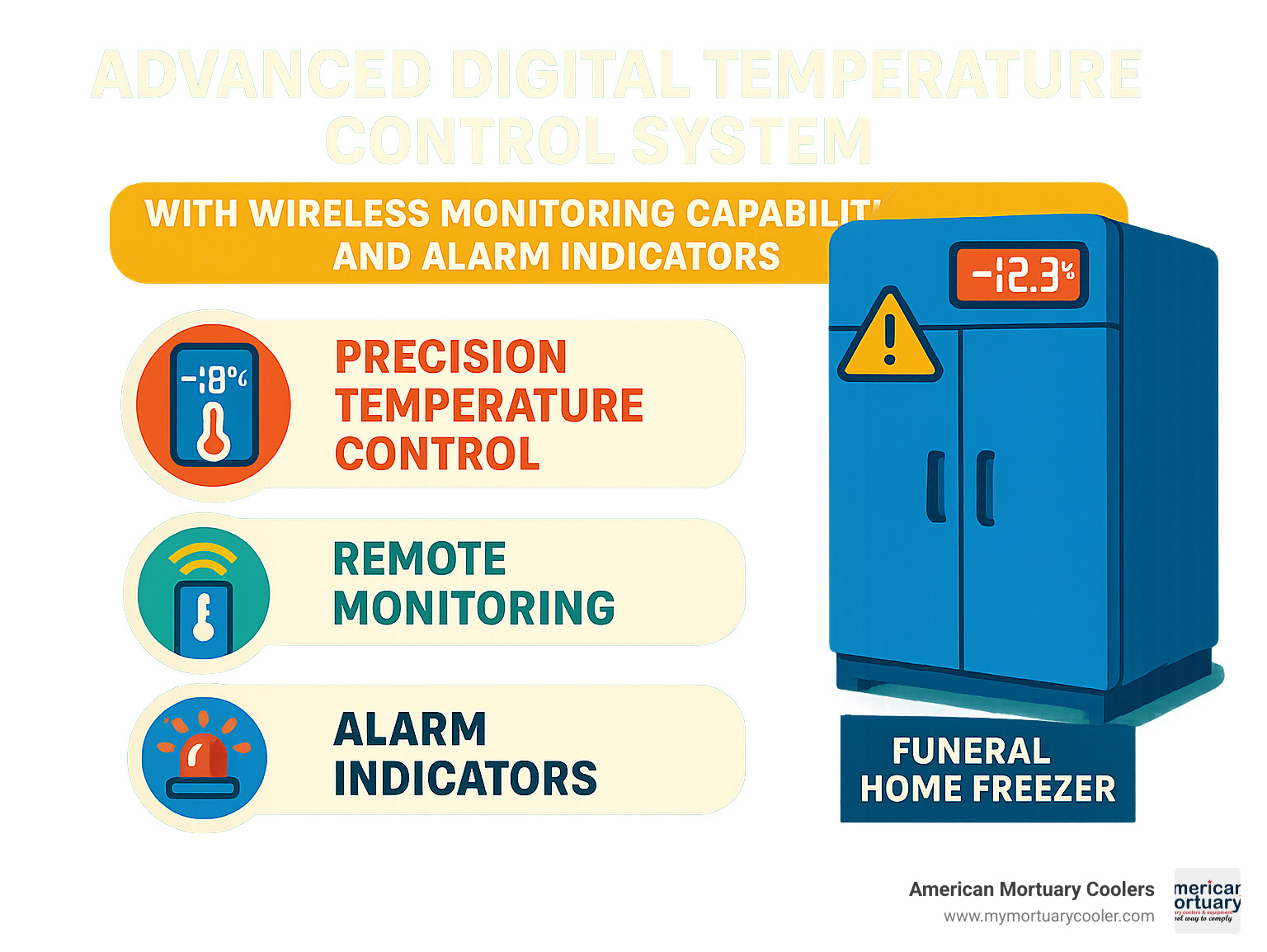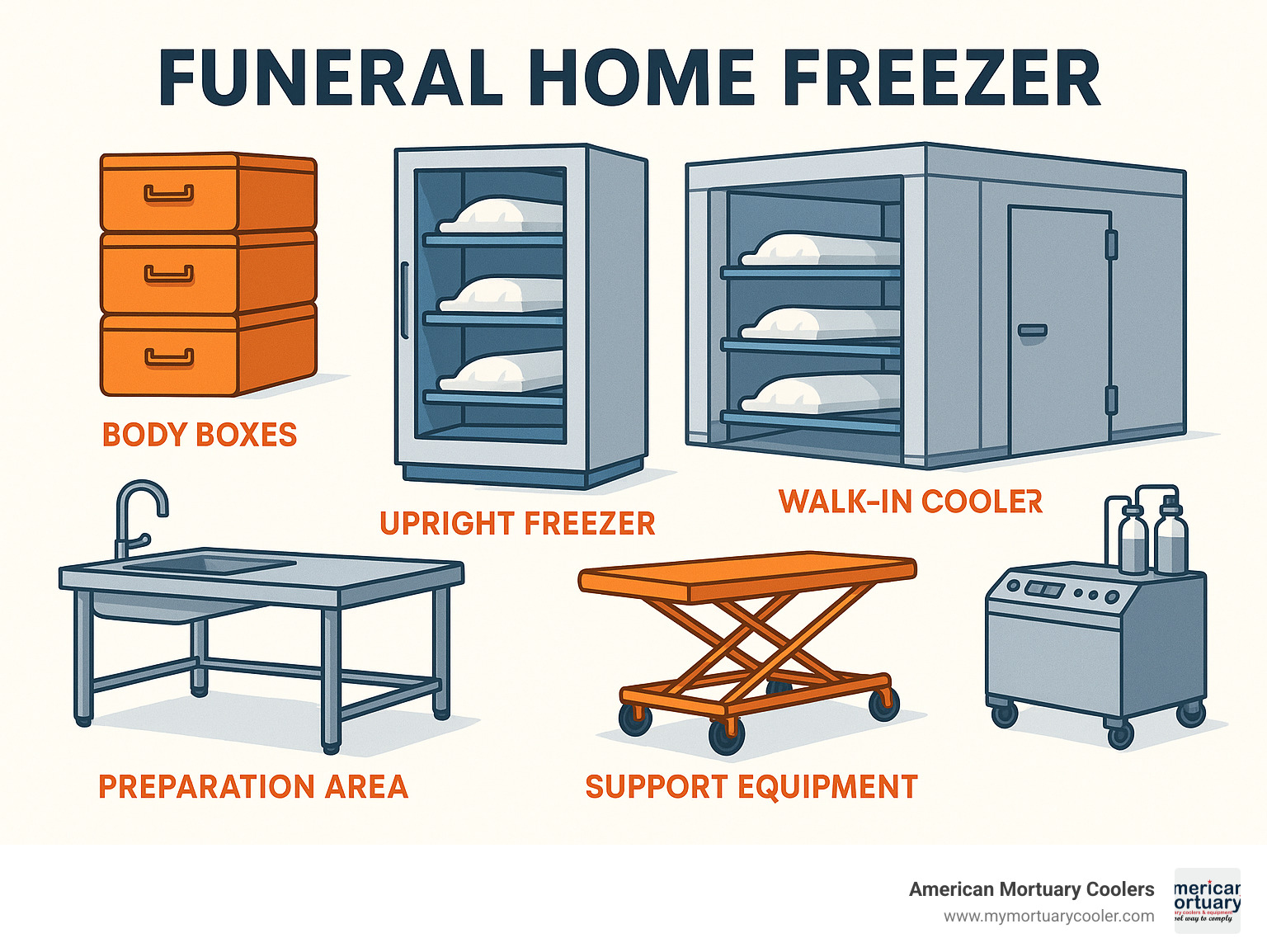Why Funeral Home Freezers Are Essential for Modern Mortuary Operations
A funeral home freezer is a specialized refrigeration unit designed to preserve deceased individuals at controlled temperatures, typically between 2°C to 5°C for refrigeration or below 0°C for freezing. These systems serve multiple critical functions:
Primary Functions:
- Preserve dignity - Slows decomposition to maintain appearance
- Extend storage time - Allows families flexibility for funeral arrangements
- Meet regulations - Complies with health codes for body storage
- Support operations - Enables scheduling flexibility and proper workflow
Key Temperature Ranges:
- Mortuary refrigerators: 2°C to 4°C (36°F to 39°F)
- Mortuary freezers: -10°C to -50°C (14°F to -58°F)
- Storage duration: 72 hours to several months depending on local regulations
When families face the loss of a loved one, time becomes precious. Research shows that maintaining consistent temperatures between 36°F and 39°F is optimal for slowing decomposition and preserving bodies for several weeks.
I'm Mortuary Cooler, a national-level mortuary cooler supplier with extensive experience helping funeral homes across America select the right funeral home freezer systems for their specific needs.

Glossary for funeral home freezer:
Funeral Home Freezer Basics: Definition & Purpose
When someone passes away, families deserve time to grieve and plan a meaningful farewell. This is where a funeral home freezer becomes essential - creating a controlled environment for cadaver storage that dramatically slows decomposition while preserving dignity.
The primary purpose goes beyond simple preservation. Modern funeral practices recognize that families often need to coordinate travel, arrange time off work, or process emotions before making important decisions. Slowing decomposition gives families the gift of time instead of the old requirement for burial within 24-48 hours.
Most states require proper refrigeration when bodies can't be buried within the standard legal waiting period of 72 hours. The industry evolution has moved from packing bodies in ice to sophisticated systems with precise temperature control.
How a Funeral Home Freezer Preserves Dignity
Dignity in death care means honoring how families want to say goodbye. A funeral home freezer removes time pressure, allowing families to create the farewell that feels right for them.
Family scheduling flexibility has become increasingly important as our society becomes more mobile. Adult children in different cities, military families overseas, or complex scheduling logistics require the breathing room that proper refrigeration provides.
Cultural rituals add complexity. Some faiths require specific preparation ceremonies that can't be rushed. Others observe mourning periods before burial. This extra time allows families to honor their traditions properly.
Funeral Home Freezer vs. Mortuary Refrigerator
While often used interchangeably, a funeral home freezer and mortuary refrigerator serve different purposes.
Most funeral homes rely on mortuary refrigerators for daily operations, maintaining temperatures between 2-4°C (36°F to 39°F), which slows decomposition while keeping tissue flexible for preparation.
A funeral home freezer operates at temperatures below 0°C, typically -10°C to -50°C, essentially halting decomposition but freezing tissue, which requires thawing before preparation.
| Feature | Mortuary Refrigerator | Funeral Home Freezer |
|---|---|---|
| Temperature Range | 2°C to 4°C (36°F-39°F) | -10°C to -50°C (14°F to -58°F) |
| Storage Duration | Days to weeks | Months to years |
| Tissue Condition | Flexible, suitable for preparation | Frozen, requires thawing |
| Primary Use | Standard funeral operations | Long-term storage, forensic work |
| Energy Consumption | Lower | Higher |
| Cost | Generally less expensive | More expensive |
Types & Capacity Options You'll See on the Market
When shopping for a funeral home freezer, you'll find options for every situation, from small family-owned funeral homes to large metropolitan morgues.
Body boxes are portable units handling one to six bodies, plugging into standard electrical outlets. Perfect for smaller operations or backup storage during busy periods.
Upright units balance space-saving design with decent capacity, from single-body units to 12-body systems. A popular 4-body upright mortuary cooler typically runs around $8,999 and fits many medium-sized facilities.
Walk-in coolers accommodate 12 or more bodies simultaneously with adjustable shelving, floor drains, and specialized flooring. These custom-built rooms offer complete customization for any space and capacity requirement.
Modular panel systems let you start small and grow as needed, with precision-formed panels that assemble, disassemble, and reconfigure as requirements change.
Roll-In & Upright Cabinets
The workhorses of most funeral homes are roll-in and upright cabinets with reliable daily performance in compact footprints.
Slide-out trays make all the difference for staff safety, extending fully to bring everything to comfortable working height instead of struggling to reach into deep storage areas.
Telescoping rails eliminate heavy lifting and awkward positioning, extending smoothly to make body handling safer and more dignified.
The compact footprint amazes many directors - a 2-body upright cooler takes no more floor space than a large household refrigerator while providing essential storage capacity.
For detailed specifications, check out More info about Funeral Home Body Freezers.
Custom Walk-In Rooms & Outdoor Units

Walk-in mortuary coolers handle 8 to 30 or more bodies, perfect for high-volume facilities. High-capacity rack systems maximize every square foot while keeping everything accessible.
Floor drains are essential for maintaining spotless conditions, with flooring built from materials that handle frequent washing while providing slip-resistant surfaces.
For outdoor installations, weatherproofing becomes critical. Advanced insulation and weather-resistant coatings ensure reliable operation in all weather conditions.
Temporary & Mobile Rentals
Rental and mobile solutions provide capacity when you need it without permanent investment.
Disaster relief trailers with mortuary refrigeration support overwhelmed local facilities during emergencies. Leasing options offer financial flexibility for temporary expansion or testing equipment before purchase.
Surge events happen to every facility - rental units deploy within 24-48 hours to maintain service quality. For facilities exploring options, Need to rent a mortuary cooler? connects you with temporary solutions.
Key Features, Technology & Safety Standards
Modern funeral home freezer systems feature advanced technology that makes operations safer, more reliable, and energy-efficient.
Stainless steel 304 construction resists corrosion from cleaning chemicals while providing seamless surfaces that eliminate bacteria-hiding cracks. Polyurethane insulation with impressive R-values keeps cold in and heat out, reducing energy consumption.
Independent compressor systems for each chamber mean if one compressor fails, other chambers continue operating. Digital controllers achieve accuracy within ±0.1°C, creating permanent records for regulatory compliance.
Triple alarm systems include audible buzzers, flashing lights, and remote notifications monitoring up to seven conditions. UPS backup systems maintain displays and alarms for up to 72 hours during power outages.
Antimicrobial treatments with silver ion technology actively fight bacterial growth 24/7. Walk-in units include safety door release mechanisms preventing staff from getting trapped inside.
Temperature Control & Monitoring Advances

Modern systems provide ±0.1°C accuracy ensuring storage conditions stay exactly where needed. Remote alert systems send text messages or emails about temperature drift, allowing 24/7 monitoring from anywhere.
Data logging capabilities create detailed records for regulatory compliance and equipment maintenance. Wireless probe technology monitors multiple zones from one central location.
Energy Efficiency & Green Refrigerants
Environmental responsibility drives modern systems to use green refrigerants like R134a and R406a that provide excellent cooling while protecting the ozone layer.
Low-ambient controls automatically adjust operation based on external conditions. Meeting EISA 2007 compliance ensures peak efficiency, with energy savings often paying for higher upfront costs within a few years.
Hygiene & Worker Safety Considerations
Seamless interior construction eliminates bacteria hiding spots, making thorough cleaning straightforward. Easy-clean gaskets resist bacterial growth while maintaining airtight seals.
Body lifts and ergonomic trolleys address injury risks from manual lifting. Ergonomic design includes proper door heights, handle positions, and control panel placement.
For comprehensive safety information, More info about funeral home supplies offers detailed guidance.
Choosing & Buying the Right Funeral Home Freezer
Finding the perfect funeral home freezer requires asking the right questions upfront about your current and future needs.
Capacity planning starts with current reality but must consider growth. If you handle 50 cases annually, plan for peak periods when that number doubles and growth over 5-10 years.
Floor space often decides between upright units that use vertical space versus walk-in systems requiring more room. Climate zones affect equipment needs - extreme temperatures require specialized low-ambient systems.
Power availability can surprise during installation. Large walk-in coolers need substantial electrical capacity, sometimes requiring upgrades not in the original budget.
Budget considerations extend beyond sticker price. Factor in energy costs over 15 years - more efficient units often save thousands in electricity while providing better temperature control.
Compliance Checklist & Regulations
OSHA standards focus on staff safety with proper ergonomic design and emergency procedures. State health codes vary dramatically and require checking specific requirements before purchasing.
NSF certification ensures equipment meets hygiene standards required for licensing. ASTM E84 testing covers fire safety for walk-in installations.
Documentation requirements have become easier with digital systems that automatically log temperatures and create inspection records.
Budgeting, Warranties & ROI
Price ranges typically span $6,000 for basic 2-body units to $30,000 for large walk-in installations. Warranty terms deserve attention - premium warranties extend up to 10 years on structural elements.
Energy rebates from utilities can offset initial costs significantly. Maintenance contracts provide predictable annual costs and priority service response.
The return on investment includes operational benefits like improved scheduling flexibility and service quality confidence, plus energy efficiency savings over the equipment's 15-20 year lifespan.
Care, Maintenance & Long-Term Operation
Your funeral home freezer needs consistent care to perform reliably for decades. Facilities with solid maintenance routines get trouble-free service, while those skipping basics face expensive repairs.
Daily cleaning with approved sanitizers prevents odors and contamination. Check door seals and temperature displays during routine cleaning.
Gasket care prevents energy waste - damaged seals force compressors to work overtime. Condenser coil cleaning every three months prevents the leading cause of compressor failure.
Calibration checks ensure accurate temperature readings. Alarm testing monthly verifies safety systems work when needed. Keep detailed service logs for warranty claims and regulatory inspections.
Troubleshooting Common Issues
Temperature drift usually develops gradually from refrigerant leaks or aging compressors. Ice buildup often indicates worn door seals or defrost system problems.
Compressor problems announce themselves with unusual sounds. Alarm faults require checking obvious causes first - doors ajar or adjusted settings.
Emergency protocols should be written and posted, including service contacts, backup storage options, and content protection steps.
When to Upgrade or Expand
Capacity issues become obvious when constantly operating at maximum capacity. Rising energy bills signal aging equipment losing efficiency.
Regulatory changes sometimes force upgrades, while technology advances can transform operations even when existing equipment functions.
For upgrade guidance, The Complete Guide to Choosing a Funeral Home Cooler covers key decision factors.
Frequently Asked Questions about Funeral Home Freezers
What temperature should a funeral home freezer run at?
Most facilities need mortuary refrigeration rather than true freezing. For standard operations, maintain temperatures between 36°F and 39°F (2°C to 4°C). This slows decomposition while keeping tissues flexible for preparation.
True freezing temperatures of -10°C to -50°C serve specific purposes like long-term storage but require thawing before preparation. Modern controllers maintain accuracy within ±0.1°C with alarm systems alerting staff when conditions drift.
How many bodies can a standard unit hold?
Body boxes accommodate 1-6 bodies while plugging into regular outlets. Upright units range from single-body to 12-body configurations, with 4-body uprights hitting the sweet spot for medium facilities.
Walk-in coolers deliver 12-30 or more bodies depending on shelving configuration. Bariatric considerations typically reduce capacity by 20-30%.
Are rentals available for short-term needs?
Yes, rental solutions deploy within 24-48 hours. Disaster relief applications provide crucial capacity during emergencies. Seasonal arrangements handle predictable capacity variations cost-effectively.
Emergency rentals ensure service quality never suffers from equipment failure or unexpected volume spikes.
Conclusion
Choosing the right funeral home freezer means investing in dignity and respect for families during difficult moments. Today's sophisticated systems offer precise temperature control, energy efficiency, and advanced monitoring that serves communities faithfully for years.
From basic body boxes starting around $6,000 to custom walk-in installations reaching $30,000, there's a solution for every facility's needs and budget. What matters most is finding equipment matching your specific requirements while planning for growth.
At American Mortuary Coolers, we craft custom solutions rather than one-size-fits-all products. Our Tennessee-based team combines industry experience with modern manufacturing, delivering equipment built to last.
Direct delivery across the contiguous 48 states means your system arrives ready for immediate operation. We've served small rural funeral homes and large metropolitan facilities, learning from each installation.
Families trust your ability to care for loved ones with dignity. Proper refrigeration forms the foundation of that care, ensuring respectful storage and regulatory peace of mind during challenging times.
When you're ready to explore options for new facilities, capacity expansion, or equipment upgrades, we guide you through selection based on your specific needs, not product pushing.
For comprehensive facility guidance, Must-Haves for Your Funeral Home and Morgue provides information on essential equipment working together to serve families with deserved dignity and respect.




















